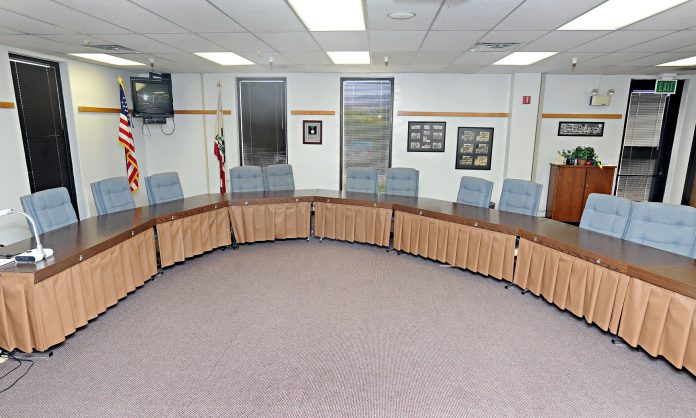In a stunning last-minute change, Morgan Hill Unified’s Board of Trustees on May 15 surprised its own staff to include two local charter schools in the funding mix of a proposed parcel tax.
Instead of voting on the final draft of a five-year, $75-per-parcel tax resolution, a board majority backed a Trustee David Gerard-led change that will give a small percentage of funds generated by the tax to Voices Academy and Charter School of Morgan Hill.
The parcel tax, if approved by district voters in November, would allocate money to the charter schools based on their enrollment of students residing in Morgan Hill.
Gerard, along with Board President Tom Arnett, Vice President Mary Patterson and trustees Gino Borgioli and Teresa Murillo, responded to Voices families in attendance who earlier had pleaded with them to not exclude their school from parcel tax funding.
“There’s absolutely, in my mind, no way this board should go forward with a parcel tax that essentially splits the community,” said Gerard prior to the board’s vote.
The district’s final draft, which was crafted by a special committee and consultants after months of planning that included a pair of community surveys, was exclusively for district-run schools. It did have a clause that addressed charter schools, promising their inclusion in future parcel taxes, but not the one headed to a Nov 6 vote.
“This is for district schools. CSMH and Voices charter schools are not district schools,” said Betando, adding that all the work that had been done leading up to the final draft was based solely on district needs. He said the plan might have taken a different path if it included the charter schools.
This week’s surprise was not the first time the board has gone against the district staff’s recommendation when it comes to charter schools. In Dec. 2017, the board supported CSMH’s Proposition 51 application for state rehabilitation funds against the district’s wishes.
Gerard said he had met with Voices representatives and believed they wholeheartedly were sincere in wanting to work cooperatively with the district to help pass the parcel tax measure.
He also claimed to have met with seven trustees from other area school boards who all told him that the parcel tax would not pass if the district did not include some funding for charter schools.
“We need more money for education in California. Let us work together,” Gerard said.
Arnett and Patterson initially said it seemed too late in the process to include charter schools in the parcel tax, although they were in favor of doing so in future measures. However, when Gerard made a motion to include the charters that was seconded by Murillo, they approved it.
“I wish we could rewind the clock to go back and include the charter schools of Morgan Hill in (earlier) discussions,” said Arnett, who admitted to being “a bit frustrated” by the predicament. “Given the fact that conversations are just coming up now, my recommendation would be to move forward with the parcel tax as it is now….(and) amend other tax revenue measures (to include charters).”
Patterson suggested they start planning right away for another parcel tax in 2020 with charter schools involved from the very beginning.
Even Borgioli, who was on board with including charters in the 2018 version, believed the district’s resolution was set to pass despite the extended dialogue amongst Voices supporters.
“I believe there are four trustees who are willing to go forward with this parcel tax even after all this dialogue (to include charters),” said Borgioli, who even tried to call the vote for the existing resolution. “For me, I’ve heard enough. There’s no going back. There’s only moving forward.”
The hour-plus debate on the parcel tax began with impassioned speeches from more than a half dozen parents of students at Voices, which is a county-authorized charter school in Morgan Hill, and continued with back-and-forth from trustees on both sides and district staff wanting to move forward as planned.
“I feel very excluded from this tax. My child won’t benefit from it,” said Victor Rodriguez, a Voices supporter. “I just feel excluded like we’re forgotten. Everyone here is really sad that we weren’t included.”
Following the board’s vote May 15 to change directions right away, district staff explained they would have to discuss the change of parcel tax plans with legal advisors before another parcel tax resolution could be drawn up for the board to vote on. They also want to meet with the charter school leaders to iron out details as far as administrative regulations of allocating the funds and recouping a portion of money already spent by the district and ongoing costs for the parcel tax from the charters if they want to receive their annual share.
If successful, the property tax is estimated to generate $1.5 million annually over the next five years. Gerard convinced the board that around 9 percent of money that comes in should go to the charter schools based on their enrollment of Morgan Hill students.
The four key areas that the tax funds will be used, described on the resolution, are:
•Core academic programs that focus on skills like science, technology, engineering and math;
•Ability to attract and retain quality teachers and staff;
•Programs to help children with special needs; and
•Programs focused on the arts.
Patrick Walsh, a regional director with the California Charter Schools Association who addressed the board May 15, said the charters would use their cut of the funds for the same reasons. CSMH Executive Director Paige Cisewski did not comment during the meeting but sat with Walsh during the proceedings.
Jim Carrillo, the district’s director of technology who headed up the parcel tax committee and led the presentation, said the parcel tax polling and consultant advice they received accounted for “programs specific to our district.” He noted that other districts did not include charter schools in their initial parcel tax measures, but added them to later measures once they were established.
“We will be going for a larger parcel tax in the future and for a longer time (than five years) so we could include the charter schools in that,” Carrillo said.
Betando said he met with Voices families the week prior and, through those discussions, suggested to the parcel tax committee to include the passage, “Even though charter schools are not included in this parcel tax, the Board of Education will reevaluate whether or not to consider including charter schools in the future.”
The next board meeting is scheduled for June 5.








